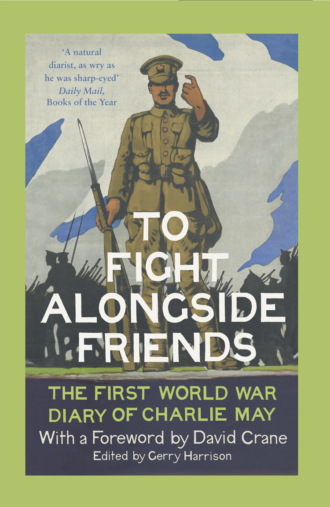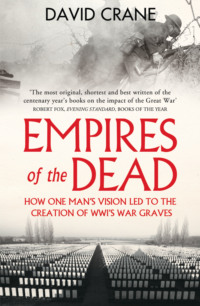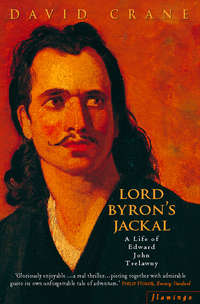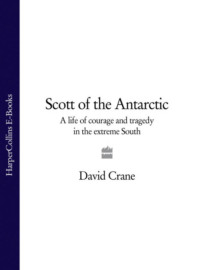
Полная версия
To Fight Alongside Friends: The First World War Diaries of Charlie May
It needs to be remembered that the 22nd was also the ‘7th City Pals’, and the strong friendships and loyalties around which the whole concept of the Pals battalions had been initiated made such losses seem more painful still. By the time that the Battle of the Somme began, the battalion formed in November 1914 had of course changed with time, deaths, promotions and new arrivals out of all recognition, but one only has to look at the parallel accounts of May’s old comrades from the Morecambe, Grantham and Lark Hill days – fascinatingly incorporated here as footnotes to his own diary entries to add fresh perspectives – to feel how strong were the bonds formed in England in a battalion like the 22nd and how bitterly the losses were mourned. ‘Tonight we had a little reunion of all the old boys,’ May himself wrote just a week before the Somme began,
There was the doctor, Murray, Worth, Bill Bland, ‘Gommy’, Meller and myself and we sat round a table and sang the old mess-songs … It was tip-top and we all loved each other. There are so many new faces with us now and so many missing that the battalion hardly felt the same – and one cannot let oneself go with the new like one loves the old boys. I would that the battalion was going over with all its old contingent. How certain we should all feel then. Not that the new stuff is not good. But we knew all the others so well.
Above all though, for Charlie May, England was his wife Maude and their baby daughter Pauline; his diary is an extended and deeply moving love-letter to them. He had married Bessie Maude Holl in February 1912 when they were both twenty-three, but it was really only when he had to leave her and their new daughter, that they both seem to have realised – not how much they had loved each other, that never seems to have been in any doubt – but how astonishingly fortunate they had been in their brief, shared lives. ‘I thought of you as we strolled there, Lizzie with her reins slack wandering where she would and at her own pace,’ he wrote after one afternoon spent riding through a world of larch and birch clumps and wood pigeons still untouched by war – a passage in which images of Maude, England and a deeply felt sense of natural beauty fuse into one to take us as close as we can probably get to what it was that Charlie May was ready to fight and, if necessary – un-heroically, reluctantly but matter-of-factly – die for.
And I longed that you could have been with me, for I know how you would have loved it and how happy we two would have been. The green rides of Epping came back to me in a flash. You in that black spotted muslin dress you used to wear looking cool and lovely so that I just asked nothing more than to walk along and gaze at you dumbly, like any simple country lout gazes at his maid.
‘I do not want to die,’ he wrote; the thought of never seeing Maude again, of his daughter growing up and never knowing him, turned ‘his bowels to water’. But as the sporadic tours in the front-line trenches and the training behind the lines intensified in the build-up to the expected great summer offensive of 1916, there became less and less room for the ‘personal’. It is impossible to read these diaries and the first casual mention of the Somme without a sense of grim foreboding, and yet at the same time there is no missing the growing excitement at the approach of battle, at the movement of troops, the massing of guns in preparation for the preliminary bombardment and the submersion of the individual in a mighty collective whole. ‘It is marvellous,’ he wrote, ‘this marshalling of power. This concentrated effort of our great nation put forward to the end of destroying our foe. The greatest battle in the world is on the eve of breaking. Please God it may terminate successfully for us.’
There had been ominous warnings for the 22nd in the weeks leading up to the Battle of the Somme – a night raid with heavy casualties that showed the German wire uncut by the artillery, dud shells and ‘whispers’ that ‘our ammunition … is not all that it should be’ – but the grief that the word ‘Somme’ would conjure up for thousands of families whose sons had flocked to enlist in the autumn of 1914 belongs to retrospect. To Charlie May the word meant only a glimmering river – ‘full of sport’, he thought it should be, as he set off to buy his fishing tackle in Corbie – idling quietly through a landscape of ‘tiny panoramas’ of bullrushes and pampas grass, of ‘brown trees, blue, sparkling waters, white, brown, red, blue and purple houses clustering around their grey churches’. The larger picture, the overall strategic concerns and aims that lay behind the Somme offensive of July 1916 – Verdun, the Eastern Front, the eternal illusion of a ‘break-through’ – were of no concern. His Great Battle – the battle that would mark ‘the beginning of the end’, he told Maude on 15 June – would be what he called the ‘Battle of Mametz’, and his responsibilities were to the men around him and the wife and daughter who were never out of his thoughts.
On the morning of the first of July, after a week of preliminary bombardment, the 22nd were part of the 7th Division, and their sector lay opposite the heavily fortified village of Mametz, on the southern edge of the Germans’ Fricourt Salient, east of Albert. On their left the British line stretched up northwards through names that would soon be seared into the national consciousness – Fricourt, La Boisselle, Thiepval, Beaumont-Hamel – and on their right, eastwards and south to Maricourt, the junction with the French army and the River Somme itself. But for the company commander of B Company, the war had shrunk to the ‘900 yards of rough ground’ in front of him and the inner battle to live up to the standards he had set himself. ‘My one consolation,’ he wrote to his wife, in one final, simple and binding credo,
is the happiness that has been ours … My darling, au revoir. It may well be that you will only have to read these lines as ones of passing interest. On the other hand, they may well be my last message to you. If they are, know through all your life that I loved you and Baby with all my heart and soul, that you two sweet things were just all the world to me. Pray God I may do my duty, for I know, whatever that may entail, you would not have it otherwise.
The diary would be the last word she had from him. He did his duty, and so, too, did the battalion of whom he was so proud. ‘They are all so clean-cut and English as you know so well, my own,’ he had written to his wife on the eve of their departure for France; ‘I feel confident they’ll go when the chance comes. Please God the 22nd may carry the old Regiment’s name another rung up the ladder of fame.’ His soldier’s prayer was answered. If his optimism in the prosecution of the war was unfounded, his confidence in the courage of his men was not. He would not live to know it – his last moments are preserved here in his wife’s desperate, unbearable need to know every detail of his end – but Mametz was taken and, almost uniquely, the battalion’s targets all met. It had been, though, at a shocking price. Of the 796 officers and men of the ‘7th City Pals’, 472 were either killed or wounded on that terrible 1 July, a day that would cost the British Army 19,240 dead and 57,470 casualties in all. May’s Battle for Mametz was over but the Battle of the Somme had only begun.
David Crane
February 2014
Prologue
‘A pippy, miserable blighter’
7–10 November 1915
Lark Hill,i 7th November ’15
I am going to commence this book this evening because now I have seen you for the last time before going abroad and I will therefore be unable to make [a] personal confession to you again for some time to come.
I arrived back here depressed from my leave-taking from you and Baby and found little to ease the sadness of my soul. More than half our fellows are out and the mess is full of the 23rd men, come over to say ‘goodbye’.ii You know how little I love them and tonight they put me in no mood to reconsider my affection. Some are singing ragtime with deplorably poor success, whilst the remainder talk ‘shop’ in loud and raucous tones. They are hateful people and I wish they would go home and allow us to make our final arrangements in peace and quietude.
Our kits have all to be on the transport wagons by 6.15 a.m. tomorrow and we follow on Tuesday. I will be jolly glad when we get on the move, as will all the rest of our fellows. We believe we are bound for St Omer. I wonder!
I wrote to you this evening but not at length because I could not. I’m such a pippy, miserable blighter that it would be a sin to convey it to you, and just when you will want bracing up.
Guillet was in this afternoon with his bride.iii They looked very well and appeared very happy. It quite reminded me of our honeymoon. By gad, my sweetheart, what happiness has been ours! It seems wonderful to me to look back upon.
8th November ’15
Had a final inspection of the men this morning, checking rifles and bayonets principally. They will get them mixed up though their innocence of any such thing is simply sublime. I had to ‘strafe’ them a bit come the last and have promised them the most diabolical punishments if they get up to the same tricks at the front. They seemed rather pleased than otherwise. But they are like that. Promise them a regular hell of a time in France and you can’t please them better. Their keenness to go is marvellous and I trust it will hold when they get there. They are topping fellows and I do hope we can bring the most of them back with us.
This afternoon the CO declared a half holiday as B and C Company were playing off the battalion final at soccer.iv It was ‘some’ match. Rivalry ran terrifically high and we all expect to hear of several fights tonight. B lost 1–nil. It was a splendid game, the best any of us have seen on the Plain. The men were simply wild about it, and I am afraid it cost a certain company commander, who ought to have known better, rather more hard cash than he cares to think about in cold blood.v
The mess is in great form tonight. Everyone is in except the CO, Merriman and Knudsen,vi who are all three spending this last evening with their wives. They have their farewells yet to do. I do not envy them, poor chaps, nor their womenfolk. Mrs Knudsen was up at the match this afternoon and I got her to give the prizes. She came into the mess afterwards and wished us all goodbye. It was rather an ordeal for her. We promised to bring [her husband] back safely for her and I sincerely trust we shall.
All our fellows are in hilarious mood, singing and joking no end. They are a grand lot and as I look at them I can’t help feeling proud of our old battalion and the men who’ve made it. They are all so clean-cut and English as you know so well, my own, I feel confident they’ll go when the chance comes. Please God the 22nd may carry the old Regiment’s name another rung up the ladder of fame.
They have me on to make a bit of a speech tonight at mess when proposing the King’s health. I wish they wouldn’t do these things. It is one of the chief trials a senior officer has to face. I always make such a hash of speeches. Go red and hum & hah and generally look a perfect ass. However, ‘faint heart never won fat turkey’, so I shall have to go through with it.
All the transport has gone now with the machine gun[s] etc. Our kit has been taken with the former so we are reduced to what we stand up in and must endure the horrors of a floor-board couch for the first time for some months. There is some proverb about hard work softening the roughest couch, I believe. I am unfortunate. I have had an easy day.
9th November ’15
We have not gone yet. That is the one and only item to be recorded today … Yet how near we were!
The right half Battalion paraded and marched off at 11.40 a.m. and had progressed as far as 600 [yards] from camp when a whistle blew and we were recalled.
How flat we felt and how everyone swore!
I understand that the bad weather in the Channel is the reason for the delay. It breaks the mines loose and you run on them and get blown to blazes.
I am sorry for the rest of the Brigade.vii It has already preceded us and I can picture whole regiments lying in puddles on the quayside with only the howl of the wind and the pattering rain-drops to sing them a lullaby. That sounds quite melodramatic. But I bet it is all that and more for the poor beggars.
We now go tomorrow at 5.30 a.m. Reveille 3.30. Bow-wow! It is hardly worth going to bed and I wouldn’t but that I had so little slumber last night.
The men I am afraid won’t sleep at all. They are now busy singing, ‘When this b..... war is over we’ll be there …’ I am afraid some of them will get drunk, which will mean a rotten tour in the morning dark for company officers. That, however, is all in the game.
Countess Brownlowviii has sent all the mess little pocket writing pads today. Very neat and very welcome. I am exceedingly pleased with mine. It was just the thing I wanted but couldn’t find. I have already written you the first note on it and have no doubt but that I will finish the pad on you, my dear girlie.
I wonder what you are doing tonight and of what you are thinking. My darling soul, when shall we meet again. When will the time come that we can once more set up our home and recommence our life of utter happiness. Ah, Maudie, how little I realised where happiness lay till this old war came along and it was denied me. How limited is a man’s mind. It does not allow him to enjoy life in the present but only to realise what moments have meant to him by looking back on them when they have passed. At any rate it has been so with me.
8.45 p.m. Fresh orders have just arrived. The 5.30 a.m. idea is now off and we do not move till 11.40. Thank heaven for its mercies and also for the forethought which led me to sneak the Second-in-Command’s blankets after he had left yesterday. I look like having a warm night’s sleep after all.
10th November ’15
At last we are under way. But our journey is destined not to be a straightforward one.ix
We came like birds as far as Folkestone, even to the pier of that town. But there we stopped. A Scotch major met us with the announcement that the Channel is closed and that we must stop the night in Folkestone billets.
A long march out into the night is the result with a longer halt on the Leasx where the wind blows chill and people say nasty things about the Army in whispers. The men were great. Never a murmur out of them after they had been warned that all was to be treated as night operations.
Our billets were eventually allotted and we got the fellows into several large empty houses – 150 in each. They are right as trivets.xi We officers dropped on a top-hole billet also. A large boarding house where guests were non est before our advent.xii
They hunted up steak and chips for us and what with this and a whiskey and soda to wash it down, we are happy as bugs in a blanket and quite satisfied with the war up to now. Don Murray, D. S. Murrayxiii and myself share a room where we have sheets and a cheval glass.xiv Corn in Egypt, I have not known such luxury since I left you, my sweetheart, and it has a most heartening effect upon one.
Especially is this so after my journey down. I came with Major Merriman and he, poor fellow, is rather depressing. I think he is obsessed with the idea that he is going to be shot. He is rather mournful about everything. I am no good in that attitude. The rest of the boys are so bright, God bless them. And yet I have no doubt but what the chances are the same for all of us.
If we don’t get away tomorrow I am going to try and find Miss Carey’sxv and see her for you. I’d be tickled to death to meet her after all you have told me of her.
Конец ознакомительного фрагмента.
Текст предоставлен ООО «ЛитРес».
Прочитайте эту книгу целиком, купив полную легальную версию на ЛитРес.
Безопасно оплатить книгу можно банковской картой Visa, MasterCard, Maestro, со счета мобильного телефона, с платежного терминала, в салоне МТС или Связной, через PayPal, WebMoney, Яндекс.Деньги, QIWI Кошелек, бонусными картами или другим удобным Вам способом.







